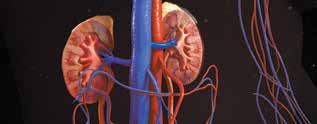
4 minute read
A pilot study for Kidney Cancer
by Associate Professor Andrew Weickhardt
The Below the Belt Research Fund has supported many members in the development of investigator-initiated studies. This year, it has provided much needed seed funding to support A/PROF ANDREW five ANZUP members to WEICKHARDT progress new trial ideas to the point of becoming full scale studies. We would like to congratulate Andrew Weickhardt on his pilot study.
68Ga-PSMA PET as a potential Imaging biomarker post tyrosine kinase inhibition of metastatic clear cell Renal Cell Cancer (PIRC) – a pilot study
Immunotherapy and tyrosine kinase inhibitors (tablet targeted therapies) have revolutionised the treatment of advanced clear cell renal cell cancer (ccRCC), the most common type of kidney cancer. Computed tomography (CT) scans are used to determine where the cancer is and how it is responding to treatments. CT scans have limitations, however, only showing us tumour deposits physically and not reflecting how active they are.
A new type of positron emission tomography (PET) scan, targeting “prostate specific membrane antigen” (PSMA), appears very useful in diagnosing the extent of ccRCC spread before treatment and to see if the treatment is working. This is likely because RCC deposits have many small blood vessels, with the PSMA protein being found in these blood vessels, and not because it is related to the prostate.
Many tablet targeted therapies affect cancer blood vessel development, and as such, this project seeks to understand whether a PSMA PET scan is useful in visualising patients’ tumours after they have been treated with these therapies.
Additionally, we want to understand if tumours that remain active on PSMA PET might be sensitive to another tablet targeted therapy, potentially allowing us to tailor the right treatment, to the right patient, at the right time.
ANZUP are currently running a number of kidney cancer trials. For more details information about these trials, go to the ANZUP kidney cancer trials web page: http://bit.ly/ANZUPkidney
KEYPAD
Status: Open & recruiting
Location: Australia wide
Activated sites: 15
Patients recruited: 42 • Patients required: 70 The most common kind of advanced kidney cancer is called clear cell kidney cancer. This trial aims to improve survival rates for people with this cancer.
Renal cell carcinoma (RCC) is the 7th most diagnosed cancer in Australia and the 14th most common cancer in Western populations. Approximately 90% of kidney cancers are renal cell carcinomas (RCC). At the moment the five-year survival rate for Australians diagnosed with kidney cancer is 78.5%, although most people with kidney cancer localised only to the kidney can be cured.
Immune therapies have been shown to be effective in about a quarter of patients with clear cell renal cell carcinoma after the standard treatment (sunitinib or pazopanib) has failed.
This study will test if denosumab, a drug frequently used to treat osteoporosis, (thinning of the bones), can team up with immune therapy to improve survival and increase the chance of the cancer shrinking for people with clear cell kidney cancer.
In the trial, people with advanced clear cell kidney cancer will be offered treatment with two antibodies (a type of protein). This trial will investigate if these drugs taken together can increase the ability of the body’s immune system to attack kidney cancer cells.
It is hoped that by combining pembrolizumab with denosumab, will stimulate the immune system, so that the immune therapy will work better in the tumours. ANZUP collaborates with the University of Sydney through the NHMRC CTC to conduct the KEYPAD Trial.
We thank and acknowledge Amgen and MSD for providing product and funding to support our KEYPAD Trial.
We are currently running the KEYPAD trial at the following locations:
NSW •Calvary Mater Newcastle •Northern Cancer Institute •Concord Repatriation General Hospital •St George Hospital •Border Medical Oncology Research Unit •St Vincent’s Hospital Sydney
QLD •Royal Brisbane & Women’s Hospital • Sunshine Coast University Hospital • Icon Cancer Care • The Townsville Hospital
SA •Flinders Medical Centre
VIC •Eastern Health •Monash Health Clayton •Ballarat Oncology and Haematology Services
WA •Fiona Stanley Hospital
UNICAB
Status: Open & recruiting
Location: Australia wide
Activated sites: 11
Patients recruited: 17 • Patients required: 48
This study aims to find how safe, tolerable and effective a new treatment called cabozantinib is for non-clear cell kidney cancer.
All patients will take cabozantinib orally every day, until the medication is no longer effective. There is no placebo (inactive treatment), which means that everyone who takes part in the trial will receive the active cabozantinib drug.
Cabozantinib is an anti-cancer drug that works by blocking cancer cell growth. Cabozantinib has previously been used in the treatment of many cancers, including clear cell kidney cancer and thyroid cancer. However, it has not been tested in people with non-clear cell kidney cancer.
Cancer trials can be undertaken in different settings. Depending on the trial, it may occur in a hospital, a clinic or the patient’s home.
We are currently running the UNICAB trial at the following locations:
NSW •Border Medical Oncology •Calvary Mater, Newcastle •Campbelltown Hospital •Macquarie University •St. George Hospital
QLD •Royal Brisbane & Women’s Hospital
SA •Adelaide Cancer Centre •Flinders Medical Centre
VIC •Goulburn Valley Hospital, Shepparton (teletrial) •Eastern Health •Monash Medical Centre, Clayton
ANZUP collaborates with the Centre for Biostatistics and Clinical Trials (BaCT) to conduct the UNICAB Trial. We thank and acknowledge Ipsen for providing product and funding to support our UNICAB Trial.










